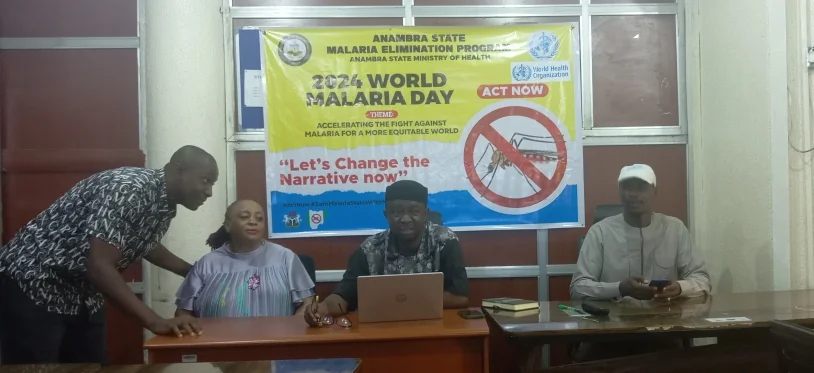Health
Anambra ready to take delivery of Malaria vaccine – says Commissioner

The Anambra State Government says it has put necessary facilities in place to be among the first states in Nigeria to receive the new R21/Matrix-Malaria vaccine.
Dr Afam Obidike, state’s Commissioner for Health, made the disclosure in Awka on Friday at a news conference to mark the 2024 World Malaria Day with the theme – “Accelerate the fight against malaria for a more equitable world.”
NEWSVERGE, reports that World Malaria Day is commemorated every April 25 to highlight the need for continued investment and sustained political commitment for malaria prevention and control.
Obidike, who was represented by Dr Afam Anaeme, Director, Public Health, said that the move was part of Gov. Chukwuma Soludo’s commitment to achieving a malaria-free state.
He said: “As we are already aware, the R21/Matrix-M vaccine has been approved and recommended for malaria prevention in children from five months to 36 months of age.
“The WHO, Gavi and partners are prepared to support Nigeria and other countries as they prepare to introduce the malaria vaccines.
“The process is still ongoing and is being overseen by the Federal Ministry of Health.
“Gov. Chukwuma Soludo made a passionate appeal to stakeholders that Anambra state should be one of the first states to have access to the vaccine.
“In preparation, we have created a space for Malaria Consortium to ensure that nothing will remove Anambra from the pool of the first set of states to get the vaccine when it is ready.”
The commissioner said that the state government’s investment and interventions had reduced the incidences of malaria in the state.
“The distribution of 3.8 million mosquito nets in partnership with Malaria Consortium, increased the use of nets from 27 per cent to 57 per cent which was above the national average of 37 per cent.
“Anambra achieved a 93.6 per cent fever testing rate in the last quarter of 2023. In the same period, 95.7 per cent of people with confirmed malaria cases were treated with the recommended ACT drug.
“In the Free Antenatal Care scheme, pregnant women are given the drug Sulphadoxine-Pyrimethamine which is used for the prevention of malaria in pregnancy.
“However, the percentage of pregnant women on the first antenatal visit who had access to this drug was 65 per cent in the last quarter. We need to sustain the momentum,” he said.
Obidike appreciated the WHO and Malaria Consortium for their contributions.
Also speaking Dr Bonos Mohammed, State Coordinator, WHO, promised to continue to support the state government to reduce health indices.




 Davido's Net Worth & Lifestyle
Davido's Net Worth & Lifestyle 
